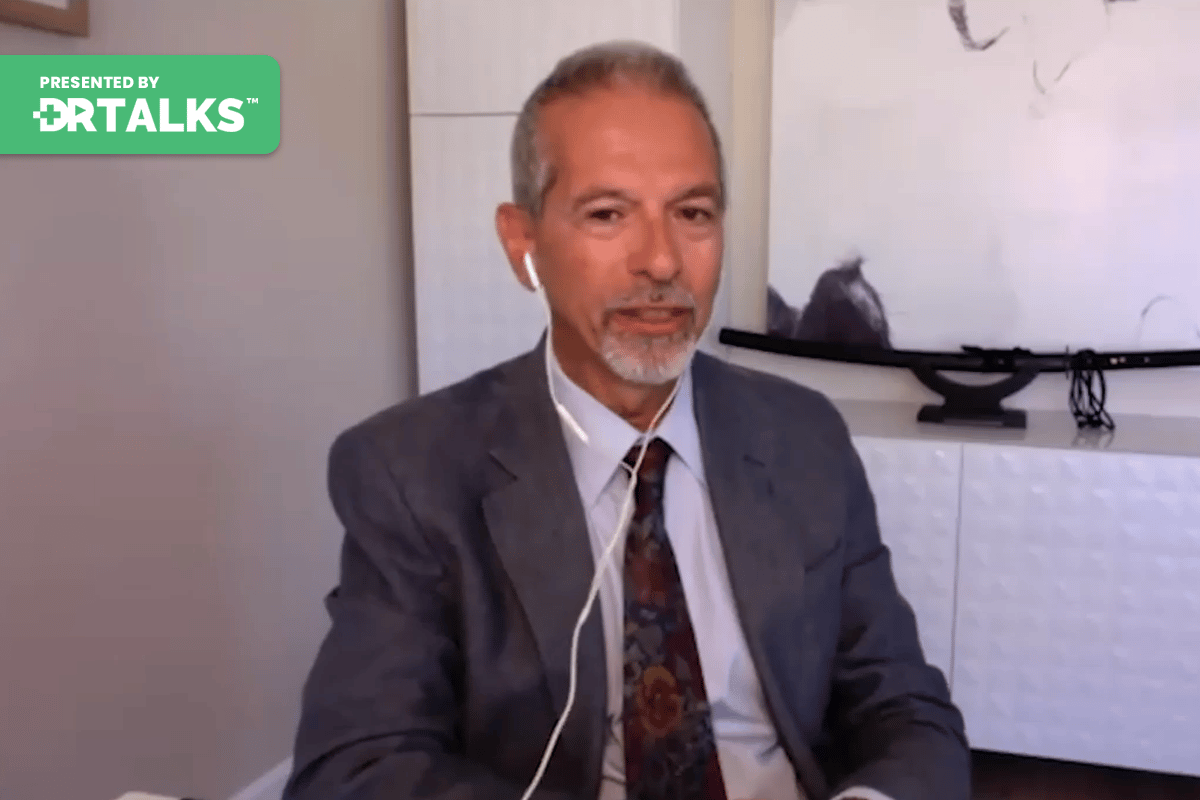Join the discussion below

Dr. Miles Nichols is a functional medicine doctor specializing in Lyme, mold illness, gut, thyroid, and autoimmunity. After Dr. Miles personally struggled with chronic fatigue in his early 20’s, Dr. Miles dedicated himself to figure out the root causes. He suffered with and recovered from thyroid dysfunction, autoimmunity, a gut... Read More

Dr. Siebecker has been specializing in SIBO since 2011. She is the 2021 lifetime achievement award recipient from the Gastro ANP, has been teaching Advanced Gastroenterology at NUNM since 2013, and is an award-winning author. She was the co-Founder and former Medical Director of the SIBO Center for Digestive Health... Read More
- Irritable Bowel Syndrome (IBS), digestive issues, and mental health
- Small Intestinal Bacterial Overgrowth (SIBO) as the primary cause for IBS
- Link between SIBO with depression and anxiety and autoimmunity
- What causes SIBO and why
- Who should test and which testing to ask for
- Stubborn and recurring SIBO: why does it recur and how to manage when it comes back
- Non-digestive symptoms that might also still indicate SIBO
Dr. Miles Nichols
Hello everyone and welcome to the Microbes and Mental Health Summit. I’m your host, Dr. Miles Nichols here today with Dr. Allison Siebecker Dr. Siebecker is a pioneer in the field of small intestinal bacterial overgrowth, otherwise known as Sibo and other digestive concerns. She’s been working with Sibo in the early days of when it began to gain popularity all the way back in 2011 and she has been a teacher not only at the N. U. N. M. Naturopathic Medical school in Portland Oregon but also broader online getting practitioners trained up on how to test for and treat small intestinal bacterial overgrowth. She’s the founder and was the medical director for the center at N. U. N. M. As well. Welcome Dr. Siebecker
Dr. Allison Siebecker
Thank you so much. Glad to be here.
Dr. Miles Nichols
Happy to have you. You’ve been really great. Not only on identifying, Sibo as not identifying it yourself, but bringing awareness to Sibo as an issue. How did this start? What was your journey to get there?
Dr. Allison Siebecker
Like so many other practitioners I have it. So I started with I. B. S. Symptoms probably at about five years old. And then it took a long time for later for me to learn about Sibo and then identify that that’s what I had and so but basically I’ve had I. B. S. Slash Sibo my whole life almost my whole life. It wasn’t born with it. And when I was always looking for answers obviously and like so many people who have I. B. S. I. B. S. Irritable bowel syndrome. It’s a mysterious condition. No one has really known what causes it. The treatments for it. Thus are not so good. They’re mostly just aimed at stopping the symptoms if you don’t really know what’s causing it, what can you do? So I was frustrated like everybody else, you know, went to medical school, not many answers there, but then eventually I found the information on Sibo that was there was a lot of research being done showing that it was the primary underlying cause of I. B. S. Other things can cause I. B. S. Too. But kind of like a primary cause. And that was when everything was amazing because then I got help for myself and I just felt a fire of passion to want to help others who had suffered like I had and get the information out there. So my focus has primarily been on awareness raising and education. So people wouldn’t have to go through what I went through now that we have answers, We don’t have all the answers. You know, I’m sure most conditions are like that right? But we’re doing pretty good. We have a lot of help now
Dr. Miles Nichols
And that’s so important when we’re dealing with syndromes, irritable bowel syndrome syndrome means collection of symptoms. It means I don’t know it’s just a collection of symptoms and typically there’s pain, there’s digestive issues like diarrhea or constipation. And the solution is give a pain medication, give an anti diarrheal drug give a laxative in the case of constipation and that works short term it works to help relieve a little bit the symptom Atala ji to help people live their life to an extent and may not work that well in some cases may work better in other cases acid blockers to block acid reflux.
But when we’re trying to understand why it’s there, that’s been a real breakthrough. I believe in the world of gastroenterology. We’re even starting to see it come into progressive traditional gastroenterologist offices although slowly and so how did your struggle? It sounds like all the way back to 5 years old. How did your struggle with digestive issues? How did you deal with that On the mental emotional side as you were struggling not knowing what was causing it and and trying to figure this out for as long as you did
Dr. Allison Siebecker
Such a good question. And the primary thing that I did is what most everybody does who has a mysterious condition. The condition that we don’t have answers for which is blamed myself. Because I’m the one experienced the symptoms and the symptoms in this case from I. B. S. And C. Bo. They come from eating and we all have to eat to survive. And so I’m the one putting the food in my mouth. You know I mean maybe when I was younger it was my parents choice but soon enough so I’m causing the problem because I’m feeding myself when I’m eating and I’m having all these symptoms and it’s so deeply embedded in people who have who don’t have answers. You know? Where else do you go? Well I must be doing something wrong, I’m doing something wrong and then it can easily go to I you know I am wrong. The other thing that occurs is shame, particularly with digestive symptoms because and many there are many other diseases and conditions that people have shame about. But people are embarrassed to talk about these things bowel movements. You know for somebody like me who teaches gastroenterology and this is you know my daily thing, it’s my normal topic but for everyone else it’s a deeply shameful thing. They don’t want to talk about going to the bathroom and what it looks like and what’s involved and if there’s pain or and farting. You know no one, you know unless you got a fun group friends, nobody wants to talk about that and want to hide it. It’s embarrassing and shameful. So for me I really felt that with the bloating bloating is one of the or abdominal distension is really the number one most common symptom of I. B. S. And Sibo And so I’ve had for years I had people compliment me on my pregnancy when I wasn’t pregnant, you know and you know by the way just any of us who we all know this with digestive problems, don’t congratulate someone unless, you know, they’re pregnant, are pregnant, right? Let them tell you first, but things like that.
So you know, I felt part of the shame that I would feel. I don’t think there’s any intellectually anything to be ashamed about the size of one’s body. My family members all struggle with obesity, I think they’re beautiful. It’s not about the fact that my stomach was large. It’s a feeling from the inside actually, because you can feel this swelling, this pressure and you know, it’s sort of tied in with anxiety and mental health. You just get a sense that something’s wrong, it’s wrong for it to be sticking out that way. It doesn’t feel healthy if something’s wrong. And then I just wanted to cover it over. I just don’t want anyone to know or see. So that’s what I struggled with my whole life and I will say that what did for me is I went into the sort of the self help psychology arena first will really, because there wasn’t any solution for the medical aspect. So I spent years in that and doing therapy and boy, that sure helped me, I’m great at accepting myself with a bloated belly or whatever, but it didn’t solve the problem. So it’s, you know, it’s always wonderful to do those things, but I needed a medical solution.
Dr. Miles Nichols
And what I’m hearing there is there’s stigma around digestive issues and talking about them. So there’s hesitation to want to really open up and share and be vulnerable about what’s truly happening, couple that together with when getting vulnerable enough to share with a medical provider the dismissal of we don’t have anything to do. It’s a syndrome. We can give you a little bit of symptom relief. That’s about all we have to offer. Maybe your stress maybe go see a psychologist or a psychiatrist to try and deal with some of this. And yeah, becomes dismissal in a different way and you get dismissed when you were already vulnerable to open up to Eva and speak about it to begin with. And that’s so hard for people who are struggling with digestive issues. And I’m sure it was for you and I had a similar thing in relation to chronic fatigue where I was told maybe it’s depression and it’s sort of they did the basic blood work and they said I don’t see it here. So maybe you need to go see a psychiatrist or a psychologist and this happened so often around issues physiologically and also mental emotional issues like depression, anxiety, which there is some research connecting Sibo and depression anxiety. Would you say little about that?
Dr. Allison Siebecker
Yeah, there are well, clinically we observe it very, very commonly in patients with SIBO and what we see is we see more anxiety than depression. And then the studies have borne that out. There’s one particular study I’m thinking of and it showed anxiety is twice as likely as depression and although both are possible. But it’s very interesting. You know there are people who they never we can talk later about how you how people can get Sibo but there are people who never had digestive troubles or Sibo, they get it and then now they have anxiety and they’ve never had that before. It’s keeping them awake at night. It’s a physical feeling, really a physiological mental feeling and they’re like oh my gosh, what is happening. So it can be very awful. One of the ways we see that it manifests is what I call negative futurist.
I mean this is probably a part of anxiety anyway, but it’s very heightened in Sibo. So when I’m discussing treatments and things with patients, they’ll say this is just an example, well what if that doesn’t work? And so then I was like, okay well then here would be Plan B. You know, okay now what if that doesn’t work okay here’s Plan C and we could go on forever. So what I usually do is I only give maybe about up to plan C. And it’s like can you just try plan A and we’ll cross that bridge when we come to it, crossing that bridge when you come to it is not a it’s not in the mental capability of an anxious person with seatbelt. It’s you know it’s very very hard. But you know and that’s another thing actually I was going to say. But you know that’s just what we have to do. Another thing is people become afraid they’re anxious.
They of course there’s a lot of fear in the situation of Sibo. Because for a lot of people there’s pain or very symptoms that cause suffering. So they’re afraid to have those symptoms occur again. People become afraid of food because food is the trigger and I can explain the physiology later. But what can happen is people become afraid of treatments so they might delay starting a treatment that could help them within a matter of weeks for years. For years. Dude when people are severely anxious and you know of course there’s treatments, one can do aim at anxiety. It just itself to calm that down just so you can get going on your Sibo treatment. But it really does require courage. It actually requires courage to move ahead with these treatments when you’re experiencing anxiety. Because what is courage, it’s feeling afraid but doing it anyway right, that’s what courage is. So these are all the things that we can face when we have when someone has
Dr. Miles Nichols
The vicious cycle of having the anxiety that may be caused by the digestive imbalance bacteria in the small intestine over growing that will get into the physiology of later that then can trigger this sense of angst about the future. And even angst about treatment or that it’s going to be this way forever or that even as it’s getting better, it’s going to come back or that the food triggers are going to be there and angst about eating. And that vicious cycle can prevent the even getting started on the path towards appropriate diagnosis and treatment and that vicious cycle to step outside of it and be able to begin the process is something that might take a little mental emotional work for some and work on the anxiety potentially first.
But the cause of the anxiety may be related to the microbes. So it have to do both in tandem with each other, just like in your story, you were good at accepting your bloated belly as it was and it didn’t resolve the belly itself. And so there are two elements of accepting and embracing what is as it is, as well as actually figuring out the underlying causes of what is and working on those both have value. They just different effects of that. So, going back to the how do where microbes and mental health, we have this microbial overgrowth. This bacterial overgrowth in the small intestine that’s creating this sense of this gas pressure and bloating and then maybe a psychologic or nervous system pressure of anxiety as well. How what’s the connection. Is there any postulated mechanism at this point?
Dr. Allison Siebecker
Yeah. You know I realized we didn’t define steamboat ever so briefly. I will you basically just described it but it’s when there’s too many and really the wrong type of bacteria that are overgrown more than what they should be in the small intestine. Normally the small intestine is well it is where we digest. Break down and absorb our food. So the body keeps the level of bacteria fairly minimal there because they would interfere with that process which is what they do when they’re overgrown. So it’s normal to have a small amount of bacteria there. And a large amount of bacteria in the large intestine that’s we’re not digesting and absorbing our food there. So it really causes a lot of problems when we have too much bacteria there.
So one of the major issues is gram negative bacteria have the cell wall component that is called and considered to be endo toxin. It’s also called liberal policy ride. And these trigger are known to trigger inflammatory cytokines and this is the postulated mechanism for the cause of anxiety and depression. We know that inflammatory cytokines. These are sort of a part of our immune system. You can chime in and say what you want about them. But that’s the brief description. We know that they can affect mood and so that is the sort of the main way that it’s thought we have an excess amount of this endotoxin. So this end a toxin is just the cell wall that our immune system reacts to. It normally does. That it’s a way of our immune system can monitor what’s happening with bacterial infection etcetera. And so it has a lot of this send a toxin in this situation and inflammatory cytokines are triggered. There’s also a mechanism that’s been postulated for a direct activation, not through cytokines which would be indirect that that’s just a theory. So you know, there may be more than one mechanism and how you know, how common is this? Not everybody gets anxiety or depression with Sibo but I’d say it’s probably like half half of people, you know, it’s common.
Dr. Miles Nichols
Yeah. And there’s a whole body of research on the connection between depression and inflammation. There’s a whole theory called the cytokine theory of depression and there are studies that look at people who go in and out of depressive episodes. People with conditions like bipolar where they’re going in and out of depressive phases and often blood biomarkers for inflammatory cytokines are going up as inflammation gets as inflammation and depression in tandem are getting worse and inflammation is going down as depression is getting better.
And so there’s this relationship and even if the direct reason why that relationship is there isn’t uncovered. There is a growing body of research that is suggestive that inflammation is connected and this liberal policy sacha ride or LPS for short. That is in those gram negative bacteria that are getting into the bloodstream. Can be this trigger for mood regulation to pray and anxiety. So with that then how do I want to circle back a little bit to the I. B. S. And irritable bowel syndrome being primarily caused by small intestinal bacterial overgrowth and why the small intestinal bacterial overgrowth to begin with.
Dr. Allison Siebecker
Right. So when we think about what causes it, there’s two levels at which I like to talk about. One would be physiologically what’s happening in the body to allow bacteria to accumulate in the small intestine when they normally wouldn’t. And then there are I guess what we call the risk factors the diseases and circumstances that can cause the physiology to go amiss so that the underlying physiology is really twofold. The primary majority situation is when the normal movement or motility of the small intestine is slowed down. So if a person thinks about peristalsis, we know the concept that food is ground up and moved down the small intestines. This is similar in this small and large intestines in the small intestine. There’s a movement called the migrating motor complex that doesn’t work with food. It’s not traditional peristalsis in that way it works during fasting. So when we’re not eating and it’s been called the housekeeper wave so it cleans up at after we’ve eaten and it’s just a sweeping movement. It’s like it’s kind of like sweeping the floor. It sweeps any debris that’s left over including bacteria. And so this happens between meals every day and overnight when we’re sleeping every day. The small intestine has this movement to make sure bacteria aren’t accumulating the body has other mechanisms to keep those bacteria levels down low. But this is the primary one that when this goes wrong Sibo then seems to develop. So the second physiologic underlying cause would be some sort of obstruction or partial obstruction, something that’s blocking the flow when the migrating motor complex tries to sweep bacteria down and out but that’s normal, something’s blocking the flow. So this could be something like an adhesion which is an internal scar band that can form for various reasons inflammation. you know trauma infection, things like that.
They’re actually very common believe it or not from you know various sports accidents and any surgery but not all of them will obstruct the small intestine. However, this is a fairly common reason to have SIBO and there’s other things that could cause partial obstructions, various anatomical situations that can happen. So if I shift my attention back that was a risk factor. If I go to the risk factors then that can cause the slow motility in the small intestine, there’s a lot and the primary one that it seems to be the sort of the most common cause is actually food poisoning. So or we would call it acute gastroenteritis medically.
But basically when people are infected with a pathologic organism that causes food poisoning like campylobacter jejune I for example or say manila then what seems to happen is an autoimmune reaction where a person’s body can in some cases not all because not all cases of food poisoning lead to I. B. S. Or Sibo It can basically use friendly fire where it finds that the toxin that the bacteria has secreted. So one of the definitions of some of the bacteria being pathogenic is that it has toxins. And all of these food poisoning causing bacteria have the same toxin and it’s called side a lethal distended toxin. And so the immune system finds that that looks very similar to one of our nerves.
One of the proteins on one of our nerves in our small intestine it just so happens. So while maybe trying to attack the toxin there might be something turned on. Word says I need to now immune system I need to to damage or attack this own nerve protein And once turned on it’s hard to turn that off. So that’s the process of auto immunity there. So it’s an autoimmune mediated circumstance and many people will develop over their lives. And population wise I mean many people will develop I. D. S. Or Sibo basically from that and just to quickly clarify you know as you mentioned I. B. S. Is a. Is a group of symptoms and it’s been determined in studies that up to 84% of I. B. S. Patients we find on average more around 60 to 70%. They’re I. B. S. Is actually Sibo. So when you run a Sibo test you find their Sibo when the Sibo was treated and eliminated the symptoms go away that’s the I. B. S. Goes away. And so that’s how it’s been identified. A majority of people there. I. B. S. Is actually Sibo and then it’s been identified a majority of those cases was from food poisoning and now there’s other causes but I’m going to just slow motility. I’m just gonna take a pause here because I spoke a lot.
Dr. Miles Nichols
Sure. Yeah. Yeah that’s a lovely description. And when people have irritable bowel syndrome. One of the ways in which that occurs if it is due to Sibo which seems to be about 6070% plus of people is this disruption in the migrating motor complex flushing mechanism when fasting sometimes I describe that to people as this sense of you’re sitting there and all of a sudden it’s rumble grumble grumble and then it’s done and that it’s what just happened. Well there was this flushing mechanism that was moving the bacteria through and out. And if that isn’t functioning then we get this build up this growth of overgrowth of bacteria that might not even be pathogenic necessarily if they’re overgrown in the large intestine, in the small intestine, the context of the function of the small intestine and it can create gas pressure in that gas pressure where the small intestine is usually the absorption of nutrients and those transport proteins to bring nutrients in is the main function.
Whereas the large intestines built for that fermentation and so in that small intestine excess fermentation creates excessive gas pressure creates this sense of distension. This sense of bloating is one of the most common symptoms. But of course diarrhea, constipation, acid reflux and many other symptoms can occur. It may be that the body has created an autoimmune response cross reactive with a response to some kind of food poisoning. Some kind of infection that has led to the side a lethal descending talks and cross reacted with twinkle in protein and that’s breaking down the smooth muscle and the ability for that actual migrating motor complex to function appropriately as well as scar tissue. Other obstruction and other reasons why small intestinal bacterial overgrowth can form.
So with all of that context there, which is beautifully illustrated by how you’re describing this and I think people can probably see more about, Oh, that makes a lot of sense as to why I might feel this bloating or this distension is there’s this gas pressure from these fermenting organisms there then how do you translate that into the anything else that might be underpinning or underlying why this happens aside from food poisoning, scar tissue. Anything else that you want to bring into the discussion?
Dr. Allison Siebecker
Because there are a lot of ways people can get Sibo. Unfortunately, particularly a lot of ways that the migrating motor complex can be slowed. And two of these I know are two of your specialties which are Lyme disease and toxic mold illness. Both of those are risk factors for slowing small intestine motility or are creating migrating motor complex deficiency. But we have others as well. Diabetes is a key one diabetes also is known to do that can slow the motility in the case of diabetes and even with Lyme and mold Sometimes it’s both the stomach and the small intestine get that gets slowed but this is important because the migrating motor complex, there’s sort of two ways that can occur. One wave can begin in the stomach and then travel through the small intestine. The other wave begins in the small intestine itself. So if the stomach motility is slowed that can then also slow the small intestine motility and in diabetes we know we have a condition called gastro paralysis where over time there’s vagal nerve damage and nerve damage.
That slow stomach emptying and then that can lead to Sibo that’s so this is how it does it. Some other conditions would be hypothyroidism, we know hypothyroidism is associated with slow motility and constipation from the large intestine, but it can also lead to Sibo Ehlers Danlos syndrome that can have both of those underpinning risk factors. So both motility can be slowed as well as structural problems because there’s lax tissue, there can be prolapse there can be adhesions and things. Some other things would be potentially parasites. We don’t have a lot of really good studies on this, We’ve got a few but then we’re thinking the mechanism could be slow motility there. Let me think if I can think of any other key ones.
I mean those are some of the big hitters, oh Parkinson’s disease, you know a lot of people think of as a disease for the elderly that occurs to the elderly but it begins in middle aged people and it often begins with constipation. So if somebody hasn’t had constipation in their whole life, they start developing it. It’s something that does need to be ruled out, I just like to mention these things not to scare people, but for awareness of early diagnosis, that’s the point right of just like just get things checked and make sure have a neurological exam, you know? So those are some of our main ones and there’s so there’s a lot of a lot of ways. Oh I forgot to say there are medications as well. So opiate narcotic painkillers, Slow motility. Everyone’s familiar with those being able to cause constipation.
They can also slow the small intestine motility and antibiotics. There was one pilot study shown that antibiotics actually can slow stomach motility. So they could be linked with a causing Sibo. A lot of patients feel report that in their best judgment they got their Sibo after taking antibiotics for some other condition. So and then proton pump inhibitors which are acid inhibitors, the strongest kind. They don’t slow stomach motility but they can turn off the acid and that’s one of our protections to kill bacteria, make sure they’re not too high. So there’s an associated risk there that particular drug is very very debated back and forth with studies. Is it really a risk factor? Is it not a risk factor? But the most recent meta analysis which is a study that looks at all the studies said that it is. So you know there are doctors out there that say for sure it’s not but I’m just going to give you the most recent study evidence.
Dr. Miles Nichols
Yeah, thank you for that big picture context. And I want to add one piece to the other. Stand those syndrome because a lot of people don’t know what that is. Don’t know if they would have that. So how would I know if I have that? Well double jointed nous or some kind of excessive mobility, hypermobility, hypermobility injuries that are common in people who are dealing with that connective tissue disorder. Anything else to add in for someone who may have that and not know. How would they know?
Dr. Allison Siebecker
Yeah, that’s a really really good one. Also it’s hereditary. It’s genetic in most cases. So for instance if your parents had I. B. S. And then you’ve had it and then or maybe then you have Children and they have it. The pretty much one of the main things we’re going to think about here is could you all have had a lower stainless and there’s a test that’s done. It’s called the biden score and you can look that up online. B. E. I. G. H. T. O. N. And it details how you can get a physical exam to find out if you have it. So that’s one of the things I like to teach. Other doctors is that a biden exam should be part of every physical exam because Ehlers Danlos is not a rare condition but we don’t have a lot of awareness about it. Like for instance when we get our regular blood work, everybody’s getting screened for diabetes. Normally they’re getting, most people are getting screened for thyroid conditions. Well, we need to be screening for a last stand close and on a regular basis. So look up the biden score. You can bring it to your doctor If you are a doctor please start doing it on your patients.
Dr. Miles Nichols
I agree. I think this is something that is more endemic than a lot of people realize and is a big underpinning for Sibo and some other problems as well in relation to the infections and toxins as underlying causes with Lyme and mold being there. And I see a lot in my practice of chronic recurrent Sibo in conjunction with those I know you also see a lot of chronic recurrent Sibo. Can you touch briefly on just briefly on the testing interpretation and get into why? Has it come back so often and how to deal with those chronic stubborn cases.
Dr. Allison Siebecker
It’s awful isn’t it briefly on testing. The main test we use is to diagnose Sibo is a breath test. The SIBO breath test there are different the way this is done as you drink a sugar solution. There are different sugars, you can drink the primary one that we tend to use that I like to recommend is lactose lactose breath test unfortunately lack telos is a prescription in the US. So you need to find a way to get that ear through a doctor. There are some labs that have physicians on staff that you can get that through but that’s the way we do it. The interpretation can differ by doctor and lab but I will just tell you mine. I prefer a three hour test because we didn’t mention this. But there are really three types of Sibo based on the gasses. There’s hydrogen gas, methane gas and hydrogen sulfide. We know that the methane and hydrogen sulfide gas is really the microbes that make those can also overgrown the large intestine. So when we use a three hour test that gives us a view of both the small and large intestine generally. So some tests are shorter but when you if you by chance if you’re running a shorter test make sure it’s okay with the lab but just try and sample your breath. Not as frequently.
So you can stretch the test to three hours because it’ll it’ll give more information to the doctor the way that I interpret them is that and these are gas numbers is that the hydrogen of 20 or above is positive in the first two hours methane, 10 or above is positive in the in the whole three hours from 3-9 is positive if you’re experiencing constipation and hydrogen sulfide that is just based on the lab which I think there’s only one lab that does this which is called Trio Smart right now. I think it’s at a level of three. But I think it got changed recently. But if I’m wrong just go by what they have on their on their form. So that’s the brief interpretation of how you get a test. One other test that’s important to know about is the test to find out if you’ve gotten it from food poisoning and that’s called the I. B. S. Smart test.
And that’s also helpful because when that’s positive we know your underlying mechanism is deficient migrating motor complex but that test will only be positive if food poisoning caused your Sibo. So you know if that was negative you still need a breath test and honestly we still need the breath test anyway because it helps us pick our treatment now as to the other thing of why does it come back? It’s chronic condition in the majority of people who get it. So the statistics are about a third of people who get Sibo is not going to be chronic. They can get it treated and it will stay gone but in two thirds it gets treated but it comes back.
So it is considered for the majority of recurrent recurrent chronic condition. The reason is because the treatments that we have currently which are better than symptomatic treatments. They are aimed at decreasing the bacteria that cause it or the microbes that cause it. But what about that underlying cause I talked about the deficient migrating motor complex or something that’s causing a partial obstruction. Some kind of an atomic situation or an adhesion. You would need to get rid of those two then not have it come back. So I guess in about a third of people maybe they don’t really have too much going on underneath that there was something that caused it, maybe it got sorted out their body, sorted it out now, you just decreased the bacteria. They’re good to go but in the rest they still have that underlying condition. So unfortunately we know from the research that when the food poisoning causes that autoimmunity we don’t we don’t we don’t know a way to cure that at this time. That is currently being researched. And I know there’s a lot of good minds working on how to properly treat Autumn Unity but we don’t have an answer currently. So if you did get your Sibo from food poisoning as an example then there’s no known cure at this time for fixing the ongoing nerve damage that comes from an autoimmune process. Diabetes is another one. I’m unaware of a cure for diabetes at this time, even though there’s lots of books that say that, but there are many excellent management strategies but you would have to fix the diabetes and the nerve damage that it caused.
Now if we take something like lime. I have many honestly colleagues who’ve gotten their Sibo from lime, I know several who got their line treated. We all know and I’m sure everyone from listening to you knows that that can be a long process. It’s not quick but it can be done and so there are people who can fully recover from Sibo depending if their underlying costs can be treated. Same thing with mold very complicated to treat long term, but if it can be resolved and if sort of the post mold syndrome that so many people have can be handled then yes, there are conditions that can be dealt with. So the underlying cause is no longer, there adhesions is another one. They’re difficult to get rid of.
The main way modern medicine would know of would be surgery which can then cause more adhesions that you know, the number one way people get adhesions is from surgery. But there are body workers and particularly there’s the word technique or the clear passage technique which is you know, a hands on the outside of the body they have before and after studies that are published showing that this physical method, manual technique they call it can actually dissolve adhesions. They use it for bowel obstructions and such. So there are conditions which we don’t know any way to get rid of this physiologic underlying cause and then others that can. So but this is why it is so chronic because we’re not actually removing the underlying cause either. There is no like another one is a scleroderma scleroderma.
It’s a rare condition but it essentially causes ultimately scarring of the intestinal tract and with that scarring comes a lack of movement that is autoimmune disease that is progressive, it gets worse and worse over time with no known cure until a cure is figured out for that. People with scleroderma will have Sibo, most of them have Sibo and we and it will come back. So now the positive side is the treatments for SIBO are very effective so we can reduce the bacteria. And then people go into remission and then that can last for a good amount of time before it Rikers. So we have good management techniques. So it’s like all is not lost. And I think this is an important point because when we say the word chronic, what a lot of people who are suffering I think is that means I will feel this bad forever. You’re telling me I’m going to be in this horrible state for the rest of my life. No, we have excellent treatments and management techniques and really good preventative techniques as well to extend those remissions. But when you’re feeling that way, that’s kind of what that word means to, you know, it just means you don’t have one treatment and never get and never have to think about it ever again in your life. There’s ongoing treatments.
Dr. Miles Nichols
And I hear a lot people who come in and say, oh I had sea boat was diagnosed and treated but the treatment didn’t work, it’s back and I say well if it went away and it got better, the treatment might have been successful. It’s just that the underlying cause it’s still there. And so it is coming back and there might need to be some kind of cyclical antimicrobial therapy in order to keep it at bay if you’re dealing with something that isn’t resolving the underlying issue. And many times people, if we do resolve lime or mold and those were the cause and the treatment at that point sticks longer or sometimes does work ongoing lee. And so there is hope for that. And there’s good management as you’re mentioning as well, circling back to why people have the beginning of wanting to even know about Sibo or test for it. Irritable bowel syndrome we spoke to already and those are the digestive symptom aspects. How many people actually have Sibo but not the classical the digestive symptom picture. How many might have other symptom picture and still have built
Dr. Allison Siebecker
Such a good question. There are studies to show that it can be found in people who are asymptomatic in terms of the digestive symptoms. I would say you need to display some kind of symptom or problem if you’re going to go down the road of treating it because this that sort of thing occurs in, in so many conditions like, you know, you can take x rays of people spine. I remember this from medical school and you know, people have things wrong, but they have no symptoms so that can happen. But what, what are your questions so interesting is I have seen quite a lot of patients who don’t have digestive symptoms, but they might have like skin symptoms, there are certain certain associated diseases.
So, for instance, one is rosacea and another psoriasis, where what they’ve uncovered with studies is they these people are not responding very well to the traditional treatments for rosacea or psoriasis. So, they do battery of tests. They find they have Sibo, they treat their Sibo with anti bacterials and lo and behold there, rosacea or psoriasis gets drastically better. So there’s situations like that. Another one is restless leg syndrome. Same thing. So that’s very odd, right? Where, you know, and then they treat the Sibo and then that goes away and there’s all papers postulating the connection and things like that. So, those are one. Another one that I think should be on people’s radar is anxiety, depression and anxiety, but particularly anxiety. If you cannot figure out why you’re having anxiety, it’s worth a c protest, I think, you know, to our theme of this summit and just find out. So, I think you need to display one some kind of symptom or problem, you know, if you are completely healthy, don’t go chasing after a test that’s positive, there’s nothing to treat, right. But if there’s something that is a problem for you, that might not be digestive, that other treatment really hasn’t helped. That’s when looking at something like a test can help.
And also to your question, I’d say two things sometimes I see people where they really only have one symptom that’s not that usual digestive symptoms. So like they just have diarrhea, they don’t have any other digestive symptom, that’s a more rare presentation. Usually people have two or three of the common symptoms which you’ve already mentioned. But in a case like that, it’s you know, if it’s mysterious, it’s worth checking and then treating if somebody has it and that might take care of it.
And the other thing I’ve noticed is sometimes people come in with like rosacea or something and they say they have no digestive symptoms and then we and you know, I’ve asked them, but then we we treat it and the reason is getting is getting better and they go, oh yeah, now my constipation is getting better or whatever and I’m like, but you said you didn’t have any. And so they truly will not report. They’re not even thinking they have digested something about just like their only focus is maybe like we call it the chief complaint, the rosacea. It’s they can’t even consciously think of another symptom enough to write it down on a former or tell a doctor so oftentimes people do have some digestive symptoms. They just can’t even recognize it somehow.
Dr. Miles Nichols
Yeah, that’s so important. And and there there are some links between, you know, muscle pains and joint pains and many other aspects possibly with Sibo but the ones that are very solidly researched, our skin issues and the aspects that were mentioned and anxiety is a great one to be keeping an eye on whether there’s a gut connection Sibo being one of those to expand just to in our last few minutes here. The bigger picture on the gut as a whole. How to differentiate with H. Pylori and parasitic infections and fungal overgrowth, including small intestinal fungal overgrowth. When Sibo testing is negative as well as general despite aosis, how do we tease all that apart in terms of looking at it in a broader context of the digestive system and how that system might connect with other body systems.
Dr. Allison Siebecker
Yeah, thank you so much. So many of these other infections, so to speak. Sibo is not technically an infection but it really acts like one. Coexist so often, especially in like a lime or mold population. Obviously you’ll see multiple of these digestive infections in the case where Sibo is negative there are some things you want to be sure the test is truly negative but we don’t that’s a little bit more Nikolay. But what a lot of practitioners will do is they run a stool test. You know a very good comprehensive stool test, functional stool test at the same time. They’re running the Sibo test so they can see what else is there for fungal overgrowth that can be seen if it’s in the large intestine. Hopefully on a stool test.
But if it’s in the small intestine that’s a lot harder to test for. The gold standard is not something we do at home. It’s, you know, going in for an endoscopy. So there are methods people use, for instance, the urine organic acid test can show fungal overgrowth without distinguishing the smaller the large intestine. If you also have a stool test and it’s negative there, but it’s positive on the on the urine test. You know that it’s in the small intestine and there’s also a blood test for to see for candida to see if the body’s immune system has decided to react against candida. Those are some tests you can check for the fungal, but you know, Sibo does often occur with fungal overgrowth and parasitic infection. Parasitic infection, as we mentioned, may even be an underlying cause for slowing the motility.
So, good stool tests are highly recommended that you don’t just look in one area. This is also really, really important for if you treat Sibo and the person’s symptoms aren’t better. It’s very important to do a retest after your Sibo treatment because this happens commonly where there are still symptoms present, Maybe they’re a bit better and a person might just think, well, I still have Sibo, but you can get a negative test then, you know, okay, I’ve got to look for parasitic infection, East infection etcetera. So
Dr. Miles Nichols
Yeah, thank you for sharing that broader context. And there’s quite a bit that can go on stomach, small intestine, large intestine and
Dr. Allison Siebecker
- Pylori. I’m sorry I didn’t mention that. Yes of course there’s testing for that too. It’s also a breath test. The best one is actually a breath test. Urea breath test.
Dr. Miles Nichols
And there can be even there’s a study that showed that certain bacteria in the large intestine can impact signaling via the vagal nerve to the brain that tells the brain to produce things like transmitters like Gaba which is relaxing and helps manage stress. And so sometimes there’s another connection with mood and stress and the vagal nerve aspect of how the gut signals to the brain and tells the brain to make or not make certain neurotransmitters. So we have lots of ways in which the connections can occur through inflammatory cytokines and the police aka ride as we discussed as well as vagal signals to the brain from the gut, telling the brain what the producer not produced. So with all of that being said, any last sense of something you’d like to help to impart to people who are struggling with chronic illness. It’s maybe anxiety, maybe depression, there may or may not be some gut dysfunction that they’re aware of any words of hope or helpful suggestions that you have for people.
Dr. Allison Siebecker
Yeah, we didn’t talk about specifically the treatments. They can be a little bit boring to talk about actually cause you can just look at a list, you know? I have an educational website. People can look at its siboinfo.com. But basically what I would mainly say is just that I have seen anxiety in particular go away after Sibo treatment. You know, and sometimes people have had anxiety for a while because they’ve had Sibo for a while and so this can be confusing. You may think, you know, I’m an anxious person, you may actually have a condition causing it. So think about that. It’s really worth getting tested to find out if you have it.
So I would say find out if you have SIBO if you’re struggling with anxiety or depression and or and or digestive problems know that there are excellent treatments and that it’s possible that it can be alleviated if this was the cause of your digestive symptoms or your anxiety and it’s just incredible to see people, you know, get better. I have seen people’s anxiety go away after being treated for Sibo. I’ve seen people’s fructose intolerance, lactose intolerance go away. So now they can eat more foods once the Sibo was cleared. So this is a message of hope.
Dr. Miles Nichols
Yeah, yeah. Food sensitivities and many other aspects. Getting better than just the digestive symptoms alone, mood and ways to be able to vary your diet more without the problematic side effects that you might have had, including things like lactose from dairy and fructose. So those are wonderful additions Dr. Siebecker. I personally endorse your siboinfo.com website. It’s an amazing resource for information and and more than sufficient for not needing to specifically discuss the treatments here because they’re well laid out and understood there together with some dietary information, some information on pharmaceutical and durable treatment options and some information on migrating motor complex and pro kinetics which we didn’t get into today. More wanted this message to be an understanding for people of how and when and why to test for and work with someone on this kind of an issue. And I think we really achieved that as well as helping to give people some sense for the real that mental emotional mood dysregulation isn’t all in someone’s head. And there are additional tools beyond just counseling and psychiatric medications which have their place and are very, very useful. And it’s also really useful to look at gut imbalances in particular, small intestinal bacterial overgrowth in that context. So, thank you so much for sharing. How do people find out more, Aside from siboinfo.com, anything else for people to find out more if they’d like to work with you follow you, see what you’re up to. How do they learn about you and your work.
Dr. Allison Siebecker
The best way is to just sign up for my newsletter. You know I send a lot of research updates. I do a lot of free classes and that you do on Siboinfo. Just go to siboinfo and sign up to be on my mailing list. I’m not seeing patients right now. I’m focusing on research, book writing. I’m updating my website doing things like that. But that’s the place I would say to go is just just get on my newsletter and I’ll I can get you tons more information that way.
Dr. Miles Nichols
Yes. Please do. The information is invaluable. So thank you so much Dr. Siebecker and thank you everyone for watching. This has been another interview on the Microbes and Mental Health Summit. I’m Dr. Miles. Take good care.
Downloads










